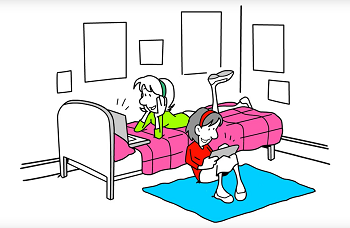Using Quizzes Out of School
After you have finished reading you can return to our
Teachers Help Page

Only 14% of a child’s life is spent in school and 33% is spent sleeping, so that leaves more than 50% of their time remaining. If we can persuade them to use just a small fraction of that 50% more profitably, then it can have a profound effect on their education.
Work/Recreation Balance
No one questions a child’s need for play/recreation but the debate still rages about the “right” amount of homework. On the one hand, Helen Silvester writing in the Science of Learning points out that, “With only rare exceptions, the relationship between the amount of homework students do and their achievement outcomes was found to be positive and statistically significant.” But on the other hand, an article in Healthline argues that students in high-achieving communities who spend too much time on homework experience more stress, physical health problems, a lack of balance in their lives and alienation from society.
So there we have it; children do better academically if they do lots of homework but we risk stressing them out if we give them too much. The amount of homework given is a balancing act that every teacher struggles with - it’s subjective.
The Right Type of Homework
What we are more certain about is the right type of homework. Professor John Hattie (a prominent researcher on how children learn) asserts that, “The worst thing you can do with homework is give kids projects; the best thing you can do is reinforce something they’ve already learned”.
Another prominent educationalist (Prof Henry Roediger III) says that, “Research shows that the brain is better at remembering when we repeat with consistency, not when we study in long, isolated chunks of time and therefore teachers should give students plenty of little quizzes, to strengthen the brain's ability to remember. Don't fret. They can be low-stakes or no-stakes. It's the steady recall and repetition that matter. As homework, students should try testing themselves instead of simply re-reading the text or class notes”.
There seems little doubt that playing educational quizzes out of school time is very beneficial and every child at your school can now do just that. Here are a few suggestions for encouraging them…
Playing Against Friends
You could suggest that children play with a classmate - one asking the on-screen questions whilst the other one answers. This kills two birds with one stone because two students will be learning simultaneously.
Playing Against Family
A similar technique can be used within families. Mum, dad or an older sibling normally relish the idea of taking on the role of quizmaster and the youngsters invariably enjoy showing-off what they know. Most aunts, uncles and grandparents have an appetite for helping youngsters to learn in line with the truism that “the older you get, the more you appreciate education”. What better way to while away an hour or two than playing quizzes with the children?
For parents with a thirst for education, all the quizzes on the site can be printed off for use on long journeys by car, coach or train. Parents and children alike find this much more entertaining than “I spy”.
Parents might also be encouraged to visit the page at Printable School Quizzes where they will find over 100 printable PDFs with a variety of quiz formats – few questions, many questions, specific subject cross-curricula and extra curricula. All designed with the purpose of providing entertaining education.
Teaching the Parents
When we first launched the site, a benefit emerged that we had never even considered. We found that many parents didn’t know the parameters of each curriculum that their children were learning and, thinking that they really OUGHT to know, they were afraid to ask. Armed with Education Quizzes they could now look down the list of quizzes in each section of the site (say KS3 Maths) and see the applicable topics and, by playing a few quizzes, they could understand the depth of knowledge required at that stage.
Sneak Previews and Revision
The structure of the site allows high-flying students to get a sneak preview of the subjects to be learned later in the same year or even in future years. At the same time, students can easily flip back to earlier curriculums if they want a rapid refresher course on something dimly remembered.
Making Use of Snippets of Time
The daily commute to and from school often finds children with spare time and a tablet or phone in their hands. Likewise, at lunch and break times. It’s unrealistic to expect them to put down their treasured device and pick up a pen but opening a tab to Education Quizzes is a much more attainable goal. It’s the easiest thing in the world for them to revise yesterday’s learning or to preview what’s ahead.
Teachers are constantly finding new ways to encourage the use of Education Quizzes out of school because the undeniable fact is the more that students play quizzes, the more they retain what is being taught.




